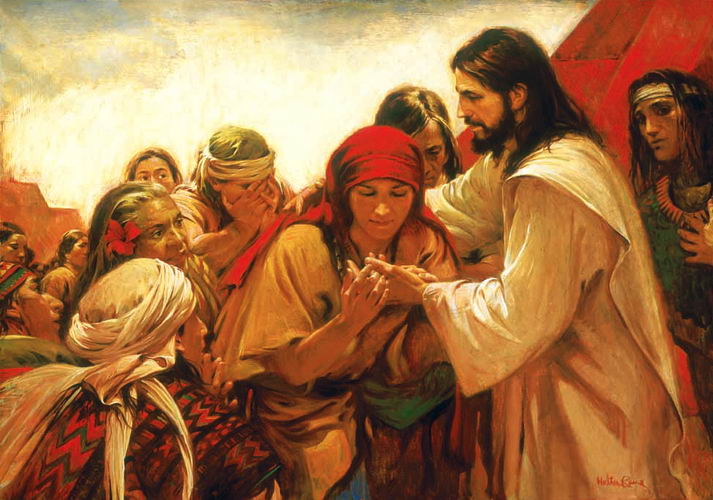This is the essence of the talk I gave on December 30, 2012 in the Little Cottonwood 9th Ward.
In our preparations we were invited to consider the talks given at conference over the past year and Brother Sorensen we could even tie it back to the Savior. I tease, but I am glad for that little reminder that all we do is based on the Savior Jesus Christ.
In my personal study I just finished rereading the most recent conference and my thoughts have turned to the twin talks of Elder Holland and Hales, focused on John chapter 21 in their addresses. In our time together I would like to bring those together and share some things I learned by studying them side by side. Before we start I’d like to share something I heard in an address that I hope sets the stage for the rest of the discussion.
Pool Story
When I was at the MTC in Provo, the following story was related by a brother who spoke at a Sunday Devotional. He spoke of a business trip he took to Boston where he had the opportunity to bring some of his grandchildren along. Being from the Salt Lake area so this was quite the trip for them.
After his meetings had concluded, he brought the grandkids together and said, ‘Okay, we are here in Boston, we can do anything you want. We can go to a baseball game, we can go see the Atlantic Ocean, go see historical sites or whatever you guys want to do…’
Each day they were there when this question was posed, the response was the same.
‘Grandpa, we just want to play in the hotel pool’ So, for three days, 1,000 miles away from home, they went to the pool.’
In summarizing the experience and relating it to us, this brother remarked, “Sometimes we are content with the wonderful and pass up the truly remarkable.”
He made the comparison to how we sometimes approach all the Lord’s many blessings and promises. He tells us, ‘seek and ye shall find, knock and it shall be open to you?’
But sometimes in our own way, we say, ‘Well thanks, but I’ll just go to church, read the scriptures and say my prayers.’ ‘I just want to play in the pool.’ As wonderful as these things are, they only scratch the surface of what the gospel of Jesus Christ can offer us when we truly take upon us His name (with all that that implies).
A Different Body of Water
So we come to Elder Holland and Elder Hales and John chapter 21: to the events surrounding a different body of water and the lessons we can learn there and, perhaps, how they can help us have truly remarkable experiences in our lives.
Come with me the shores of Galilee.
I’ll begin with Elder Holland’s commentary,
Their Lord and Master, their Counselor and King, was crucified. His mortal ministry was over, and the struggling little Church He had established seemed doomed to scorn and destined for extinction. His Apostles did witness Him in His resurrected state, but that only added to their bewilderment. As they surely must have wondered, “What do we do now?” they turned for an answer to Peter, the senior Apostle.
Here I ask your indulgence as I take some nonscriptural liberty in my portrayal of this exchange. In effect, Peter said to his associates: “Brethren, it has been a glorious three years. . . But that is over. He has finished His work, and He has risen from the tomb. He has worked out His salvation and ours. So you ask, ‘What do we do now?’ I don’t know more to tell you than to return to your former life, rejoicing. I intend to ‘go a fishing.’” And at least six of the ten other remaining Apostles said in agreement, “We also go with thee.” John, who was one of them, writes, “They went forth, and entered into a ship immediately.”
You will recall that three years previous that on these same shores was where Christ had first come to Peter and his brethren.
“And he saith unto them, Follow me, and I will make you fishers of men.
“And they straightway left their nets, and followed him.”
Elder Hales taught,
As Christians today, we have the opportunity to act straightway, immediately, and decisively, just as Peter and Andrew did: “they forsook their nets, and followed him.” We too are called upon to leave our nets, to reject worldly habits, customs, and traditions. We are also called to forsake our sins.”
And so you and I, have started down this road of discipleship. Elder Hales continues,
This change, called conversion, is possible only through the Savior. Jesus promised: “If men come unto me I will show unto them their weakness. … And my grace is sufficient for all men that humble themselves before me; for if they humble themselves before me, and have faith in me, then will I make weak things become strong unto them.”5 As we are made new in Christ, our very natures change and we no longer want to go back to our old ways.
Even so, faithful Christians will always be blessed to experience difficulties and disappointments. When these refining challenges come, we may be tempted to return to our old ways. After the Savior’s Crucifixion, He appeared to the women and told them that the brethren would find Him in Galilee. When Peter, the senior Apostle, returned to Galilee, he also went back to what he knew—to what he felt comfortable doing. “I go a fishing,”6 he explained, and took several disciples with him.
The Shores of Galilee
At the beginning fo a new year, as we consider fresh beginnings and resolutions, I have found so much personal application in this story. As I considered these experiences, from the pool to the shores of Galilee, I ask myself these questions:
- What are my personal shores of Galilee?
- In what ways do we spiritually go fishing?
- In what ways are we content with the wonderful and pass on the truly remarkable?
I think in many ways the shores of Galilee and the Pool from my first story represent where we are comfortable, what in the gospel comes easy for us. So when a challenge, uncomfortable task, or hard lesson lies before me, sometimes I find myself retreating to my personal shores of Galilee.
But as the case was with Peter and his brethren, often when we retreat back there, our toils in the night don’t yield much fruit.
Elder Holland continues the narrative,
Their first night back on the lake, they caught nothing—not a single fish. With the first rays of dawn, they disappointedly turned toward the shore, where they saw in the distance a figure who called out to them, “Children, have you caught anything?” Glumly these Apostles-turned-again-fishermen gave the answer no fisherman wants to give. “We have caught nothing,” they muttered, and to add insult to injury, they were being called “children.”4
“Cast the net on the right side of the ship, and ye shall find,” the stranger calls out—and with those simple words, recognition begins to flood over them. Just three years earlier these very men had been fishing on this very sea. On that occasion too they had “toiled all the night, and [had] taken nothing,” the scripture says. But a fellow Galilean on the shore had called out to them to let down their nets, and they drew “a great multitude of fishes,” enough that their nets broke, the catch filling two boats so heavily they had begun to sink.
Now it was happening again. These “children,” as they were rightly called, eagerly lowered their net, and “they were not able to draw it for the multitude of fishes.”8 John said the obvious: “It is the Lord.”9 And over the edge of the boat, the irrepressible Peter leaped.”
In the Book of Haggai, in the Old Testament, I love these words inviting us to reflect,
Now therefore thus saith the Lord of hosts; Consider your ways.
Ye have sown much, and bring in little; ye eat, but ye have not enough; ye drink, but ye are not filled with drink; ye clothe you, but there is none warm; and he that earneth wages earneth wagesto put it into a bag with holes.
Thus saith the Lord of hosts; Consider your ways,” (Haggai 1:5-7).
I return to Elder Holland,
“Peter had an exchange with the Savior that I consider the crucial turning point of the apostolic ministry generally and certainly for Peter personally, moving this great rock of a man to a majestic life of devoted service and leadership.”
You will recall the Savior’s words,
Peter do you love me? Feed my lambs.
Peter do you love me? Feed my lambs.
Peter do you love me? Feed my sheep.
Elder Hales taught us,
This is the call of Christ to every Christian today: “Feed my lambs. … Feed my sheep” . . .
For many, the call to be a Christian can seem demanding, even overwhelming. But we need not be afraid or feel inadequate. The Savior has promised that He will make us equal to His work. “Follow me,” He said, “and I will make you fishers of men.”10 As we follow Him, He blesses us with gifts, talents, and the strength to do His will, allowing us to go beyond our comfort zones and do things we’ve never before thought possible. This may mean sharing the gospel with neighbors, rescuing those who are spiritually lost, serving a full-time mission, working in the temple, raising a child with special needs, loving the prodigal, serving an ailing companion, enduring misunderstandings, or suffering affliction. It means preparing ourselves to answer His call by saying, “I’ll go where you want me to go; I’ll say what you want me to say; I’ll do what you want me to do; I’ll be what you want me to be.”
Our Weekly Feast
As I have reflected on this experience of the apostles on the shores of Galilee, there’s a pattern that emerged, that I personally would like to take forward into the new year.
Every week I get to come to place where I am very comfortable. It’s a place where I can ‘go fishing’ for truth and insights into the gospel. I get to come to church and come to this sacrament meeting. Here we do not eat fishes, but bread and water. As we partake of the Sacrament, each of us get an opportunity to dine with the Savior.
In the quiet time when the bread and water is passed, I will let the Savior ask me,
‘James, lovest thou me?’ and as humbly as I can, I’ll respond, “Lord, thou knowest that I love thee.”
Then I’ll let the spirit guide in the invitation to follow him, “Feed my lambs, feed my sheep.” I’ll consider my ways and let Spirit help me recognize opportunities to be a disciple of Christ in the coming week.
I trust that as I act on those impressions, the light to see where I can improve will grow. My capacity to serve will increase. Line upon line, I can become the type of disciple Christ needs me to be in my home, in my ward, in work and with all those I meet.
[Testimony/Close]
Featured image courtesy of James Emery via Flickr.



You must be logged in to post a comment.